Nursing Theories Presentation: Reviewing Theories from Eight Modules
VerifiedAdded on 2022/09/08
|28
|2861
|15
Presentation
AI Summary
This presentation provides a comprehensive review of eight key nursing theories, including Nightingale's Environmental Theory, Peplau's Interpersonal Relations Theory, Orlando's theory, King’s conceptual theory, Roy’s theory, Watson’s theory, and Parse’s Theory. Each theory is described, with examples of its application in current practice, positive patient outcomes, benefits to nursing satisfaction, and barriers to its use, along with methods to overcome these barriers. The presentation, designed for a nursing course, utilizes the textbook and outside references to support the information, offering a detailed analysis of each theory's impact on nursing practice. This assignment, contributed by a student, is available on Desklib, a platform offering AI-based study tools for students.
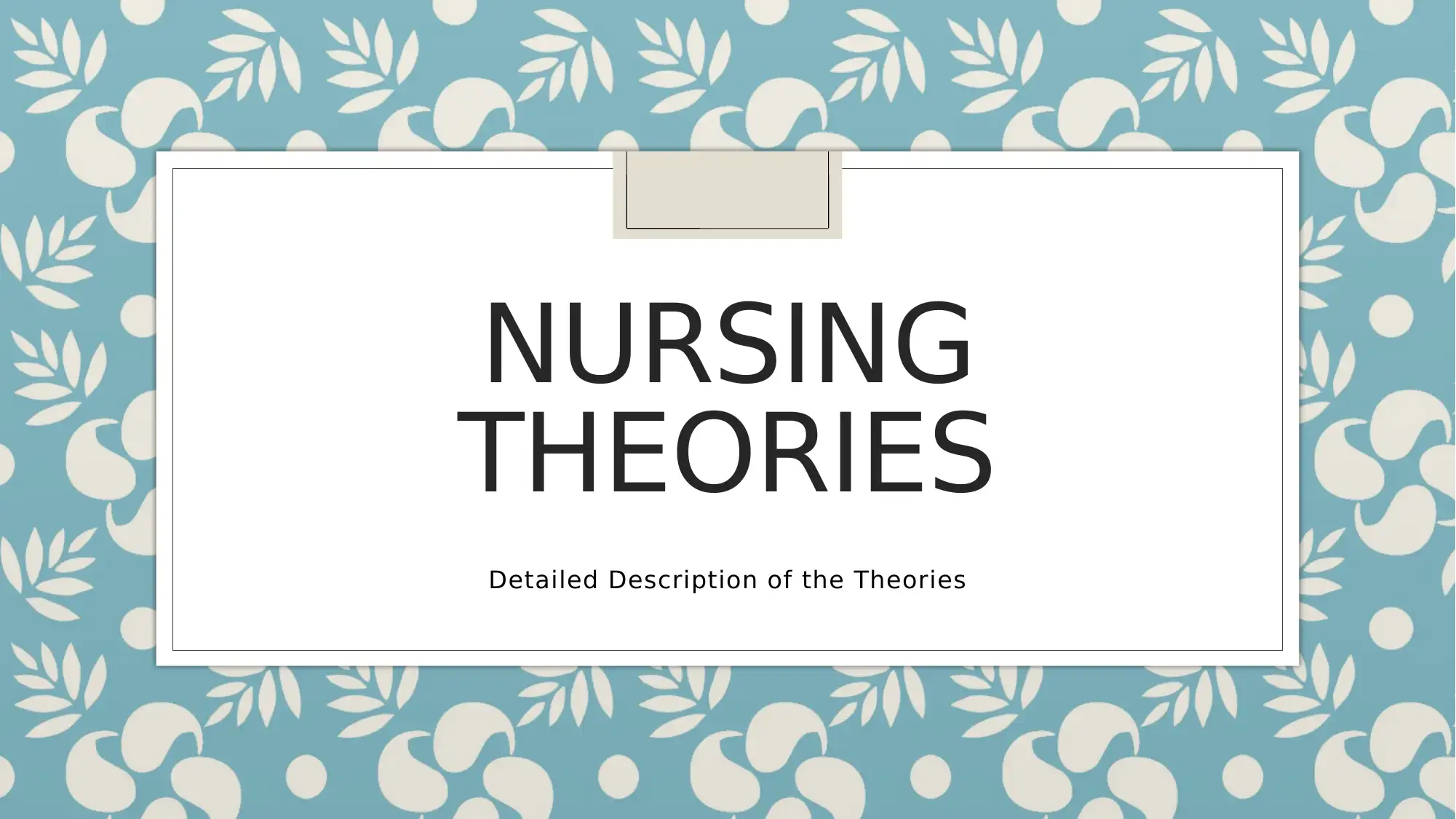
NURSING
THEORIES
Detailed Description of the Theories
THEORIES
Detailed Description of the Theories
Paraphrase This Document
Need a fresh take? Get an instant paraphrase of this document with our AI Paraphraser
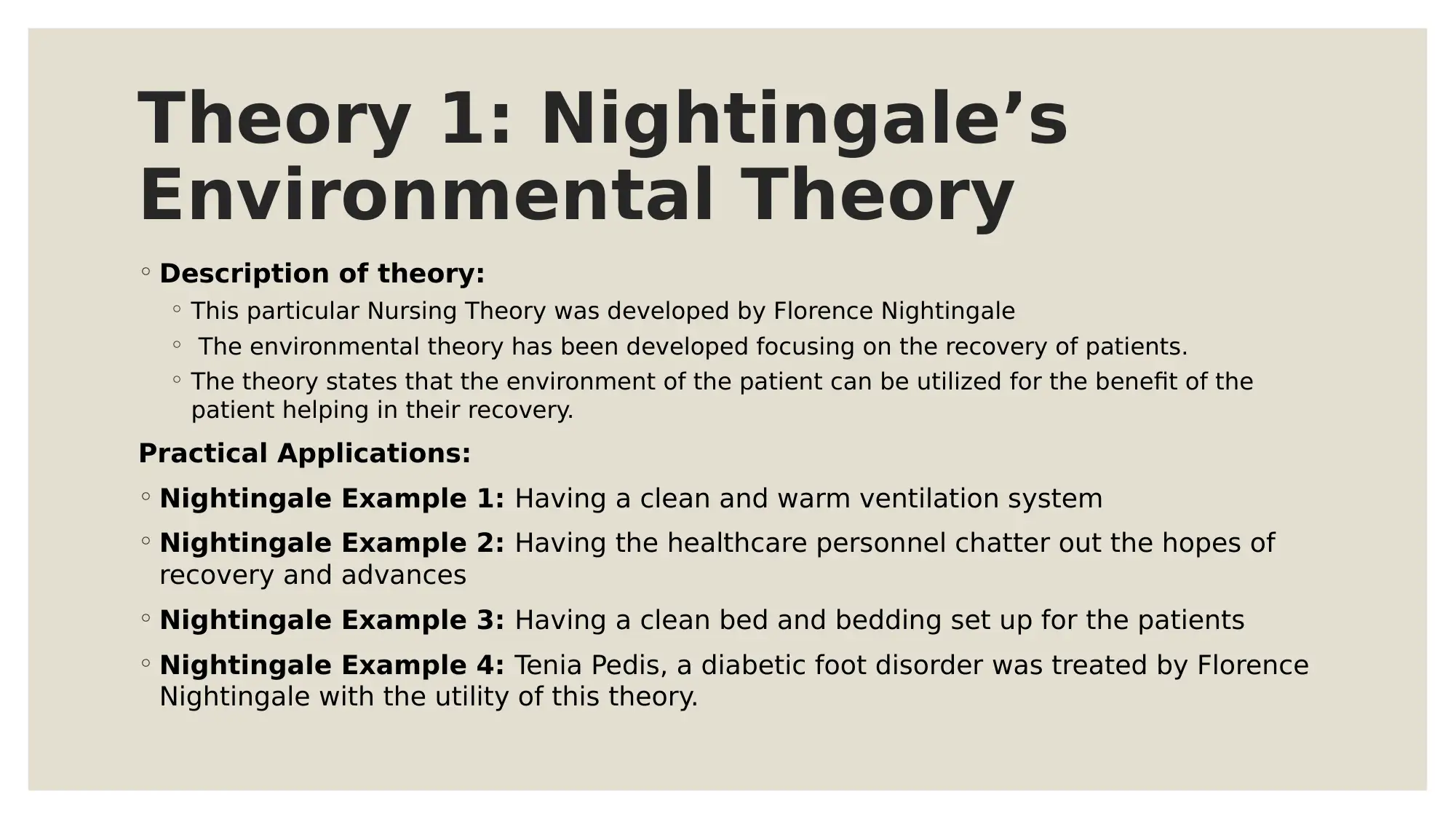
Theory 1: Nightingale’s
Environmental Theory
◦ Description of theory:
◦ This particular Nursing Theory was developed by Florence Nightingale
◦ The environmental theory has been developed focusing on the recovery of patients.
◦ The theory states that the environment of the patient can be utilized for the benefit of the
patient helping in their recovery.
Practical Applications:
◦ Nightingale Example 1: Having a clean and warm ventilation system
◦ Nightingale Example 2: Having the healthcare personnel chatter out the hopes of
recovery and advances
◦ Nightingale Example 3: Having a clean bed and bedding set up for the patients
◦ Nightingale Example 4: Tenia Pedis, a diabetic foot disorder was treated by Florence
Nightingale with the utility of this theory.
Environmental Theory
◦ Description of theory:
◦ This particular Nursing Theory was developed by Florence Nightingale
◦ The environmental theory has been developed focusing on the recovery of patients.
◦ The theory states that the environment of the patient can be utilized for the benefit of the
patient helping in their recovery.
Practical Applications:
◦ Nightingale Example 1: Having a clean and warm ventilation system
◦ Nightingale Example 2: Having the healthcare personnel chatter out the hopes of
recovery and advances
◦ Nightingale Example 3: Having a clean bed and bedding set up for the patients
◦ Nightingale Example 4: Tenia Pedis, a diabetic foot disorder was treated by Florence
Nightingale with the utility of this theory.
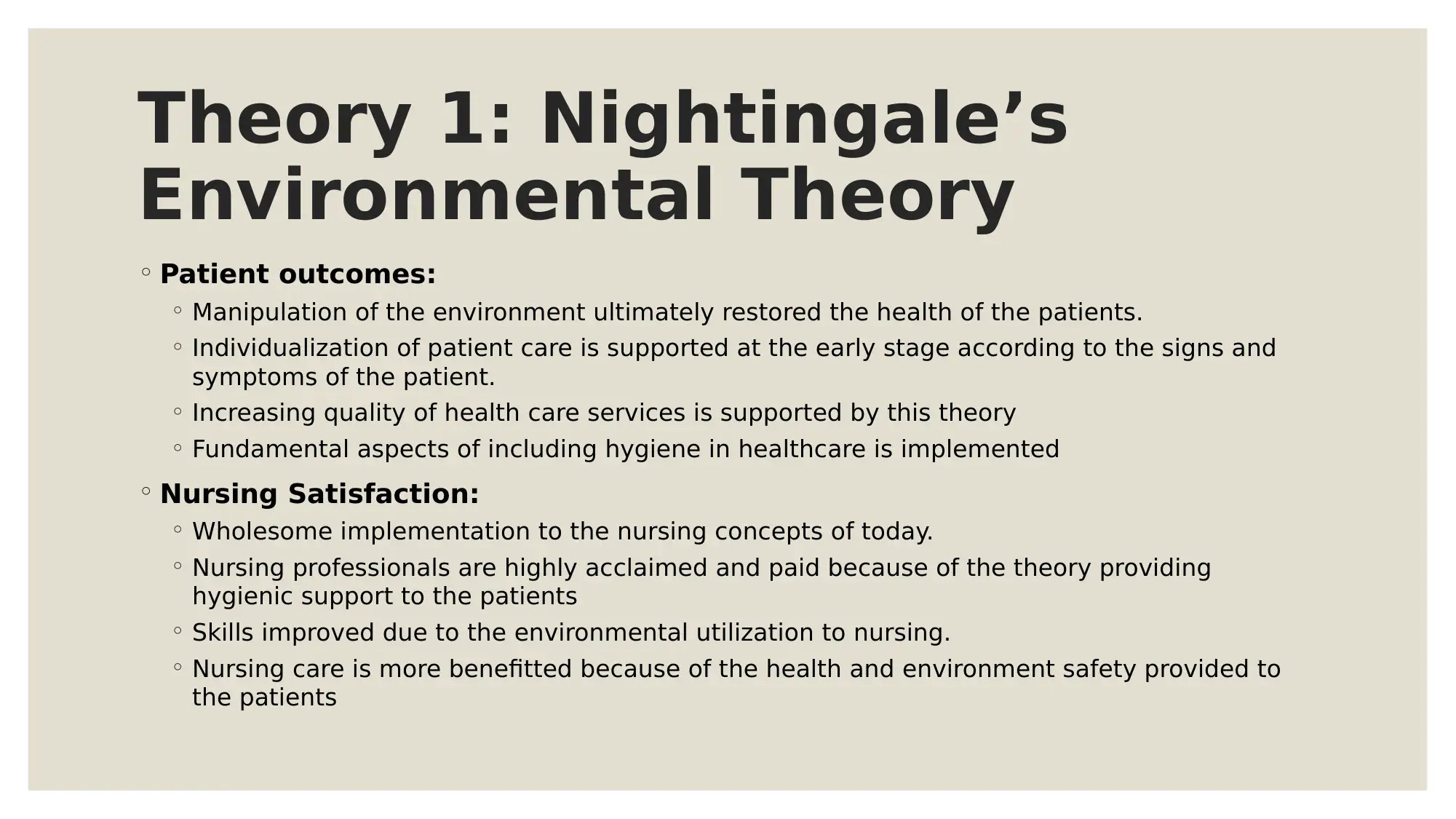
Theory 1: Nightingale’s
Environmental Theory
◦ Patient outcomes:
◦ Manipulation of the environment ultimately restored the health of the patients.
◦ Individualization of patient care is supported at the early stage according to the signs and
symptoms of the patient.
◦ Increasing quality of health care services is supported by this theory
◦ Fundamental aspects of including hygiene in healthcare is implemented
◦ Nursing Satisfaction:
◦ Wholesome implementation to the nursing concepts of today.
◦ Nursing professionals are highly acclaimed and paid because of the theory providing
hygienic support to the patients
◦ Skills improved due to the environmental utilization to nursing.
◦ Nursing care is more benefitted because of the health and environment safety provided to
the patients
Environmental Theory
◦ Patient outcomes:
◦ Manipulation of the environment ultimately restored the health of the patients.
◦ Individualization of patient care is supported at the early stage according to the signs and
symptoms of the patient.
◦ Increasing quality of health care services is supported by this theory
◦ Fundamental aspects of including hygiene in healthcare is implemented
◦ Nursing Satisfaction:
◦ Wholesome implementation to the nursing concepts of today.
◦ Nursing professionals are highly acclaimed and paid because of the theory providing
hygienic support to the patients
◦ Skills improved due to the environmental utilization to nursing.
◦ Nursing care is more benefitted because of the health and environment safety provided to
the patients
⊘ This is a preview!⊘
Do you want full access?
Subscribe today to unlock all pages.

Trusted by 1+ million students worldwide
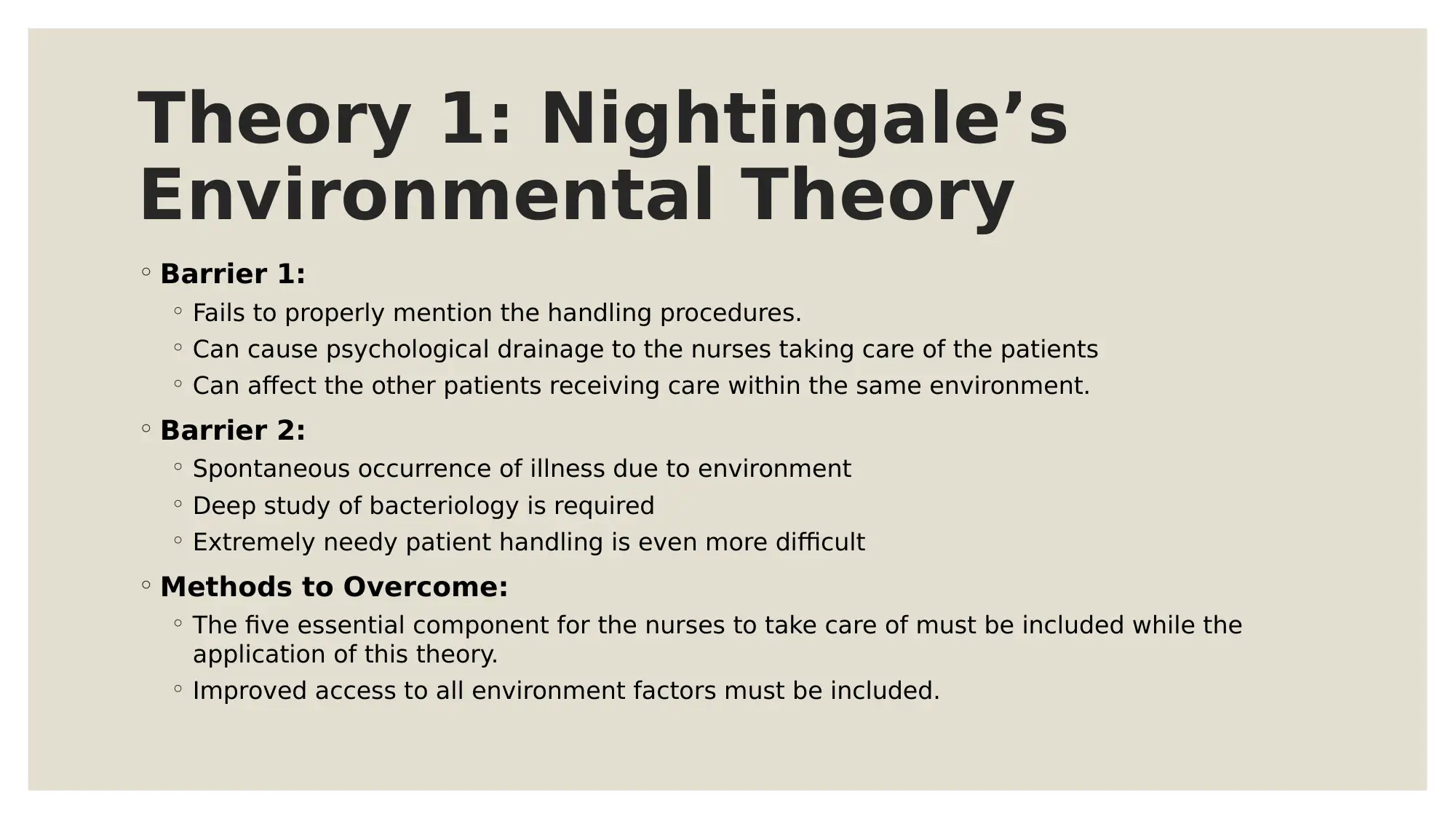
Theory 1: Nightingale’s
Environmental Theory
◦ Barrier 1:
◦ Fails to properly mention the handling procedures.
◦ Can cause psychological drainage to the nurses taking care of the patients
◦ Can affect the other patients receiving care within the same environment.
◦ Barrier 2:
◦ Spontaneous occurrence of illness due to environment
◦ Deep study of bacteriology is required
◦ Extremely needy patient handling is even more difficult
◦ Methods to Overcome:
◦ The five essential component for the nurses to take care of must be included while the
application of this theory.
◦ Improved access to all environment factors must be included.
Environmental Theory
◦ Barrier 1:
◦ Fails to properly mention the handling procedures.
◦ Can cause psychological drainage to the nurses taking care of the patients
◦ Can affect the other patients receiving care within the same environment.
◦ Barrier 2:
◦ Spontaneous occurrence of illness due to environment
◦ Deep study of bacteriology is required
◦ Extremely needy patient handling is even more difficult
◦ Methods to Overcome:
◦ The five essential component for the nurses to take care of must be included while the
application of this theory.
◦ Improved access to all environment factors must be included.
Paraphrase This Document
Need a fresh take? Get an instant paraphrase of this document with our AI Paraphraser
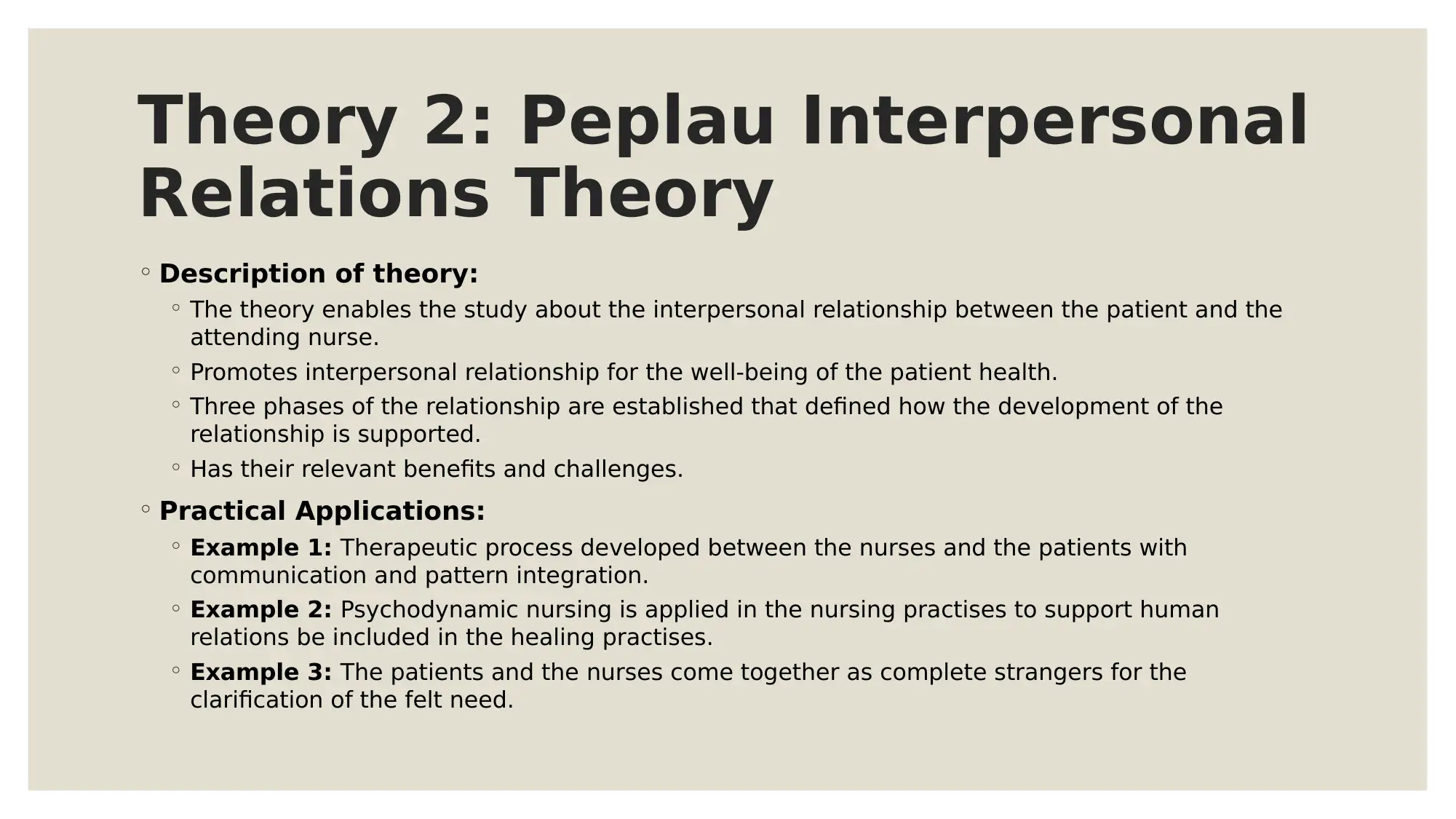
Theory 2: Peplau Interpersonal
Relations Theory
◦ Description of theory:
◦ The theory enables the study about the interpersonal relationship between the patient and the
attending nurse.
◦ Promotes interpersonal relationship for the well-being of the patient health.
◦ Three phases of the relationship are established that defined how the development of the
relationship is supported.
◦ Has their relevant benefits and challenges.
◦ Practical Applications:
◦ Example 1: Therapeutic process developed between the nurses and the patients with
communication and pattern integration.
◦ Example 2: Psychodynamic nursing is applied in the nursing practises to support human
relations be included in the healing practises.
◦ Example 3: The patients and the nurses come together as complete strangers for the
clarification of the felt need.
Relations Theory
◦ Description of theory:
◦ The theory enables the study about the interpersonal relationship between the patient and the
attending nurse.
◦ Promotes interpersonal relationship for the well-being of the patient health.
◦ Three phases of the relationship are established that defined how the development of the
relationship is supported.
◦ Has their relevant benefits and challenges.
◦ Practical Applications:
◦ Example 1: Therapeutic process developed between the nurses and the patients with
communication and pattern integration.
◦ Example 2: Psychodynamic nursing is applied in the nursing practises to support human
relations be included in the healing practises.
◦ Example 3: The patients and the nurses come together as complete strangers for the
clarification of the felt need.
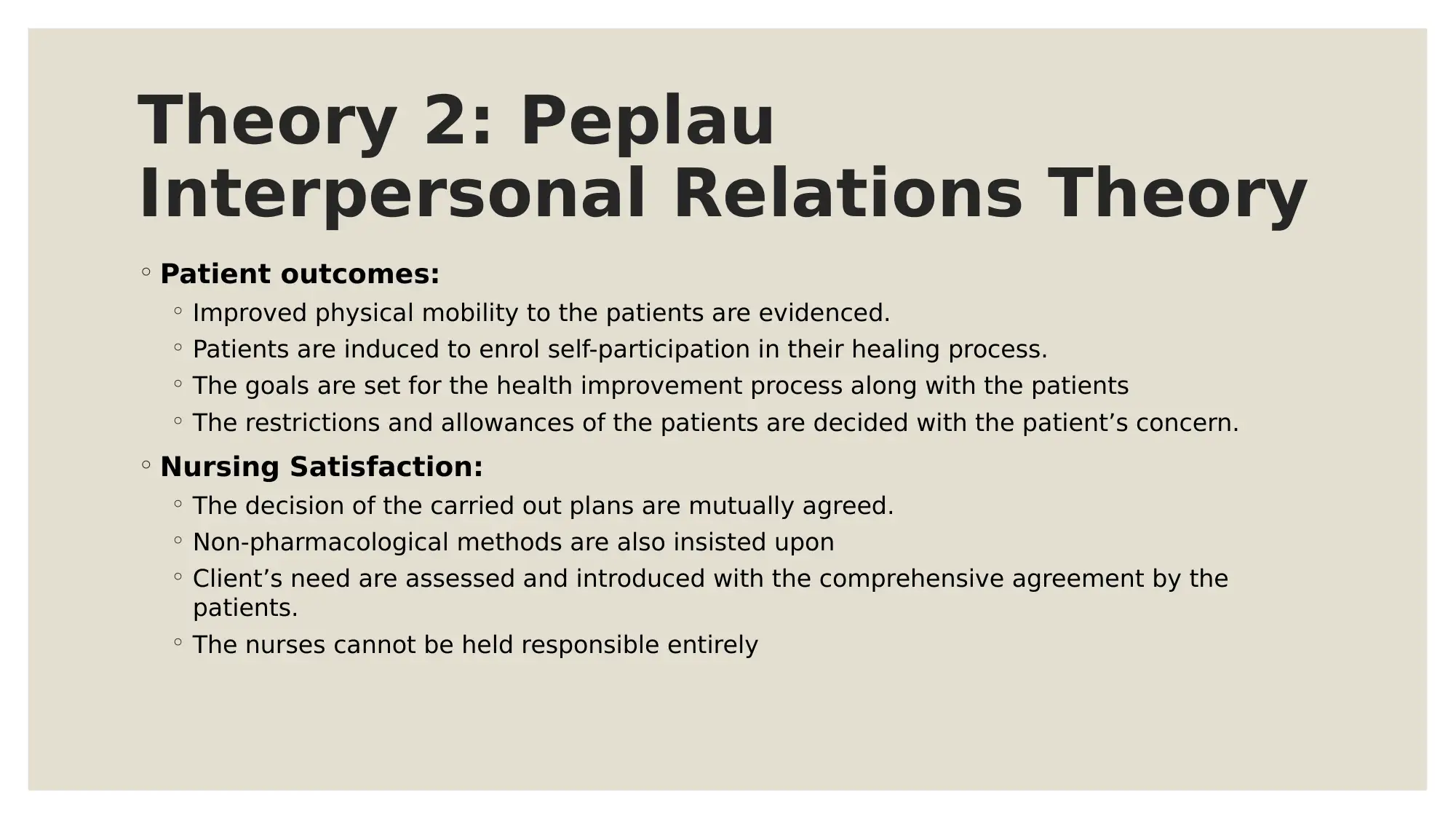
Theory 2: Peplau
Interpersonal Relations Theory
◦ Patient outcomes:
◦ Improved physical mobility to the patients are evidenced.
◦ Patients are induced to enrol self-participation in their healing process.
◦ The goals are set for the health improvement process along with the patients
◦ The restrictions and allowances of the patients are decided with the patient’s concern.
◦ Nursing Satisfaction:
◦ The decision of the carried out plans are mutually agreed.
◦ Non-pharmacological methods are also insisted upon
◦ Client’s need are assessed and introduced with the comprehensive agreement by the
patients.
◦ The nurses cannot be held responsible entirely
Interpersonal Relations Theory
◦ Patient outcomes:
◦ Improved physical mobility to the patients are evidenced.
◦ Patients are induced to enrol self-participation in their healing process.
◦ The goals are set for the health improvement process along with the patients
◦ The restrictions and allowances of the patients are decided with the patient’s concern.
◦ Nursing Satisfaction:
◦ The decision of the carried out plans are mutually agreed.
◦ Non-pharmacological methods are also insisted upon
◦ Client’s need are assessed and introduced with the comprehensive agreement by the
patients.
◦ The nurses cannot be held responsible entirely
⊘ This is a preview!⊘
Do you want full access?
Subscribe today to unlock all pages.

Trusted by 1+ million students worldwide
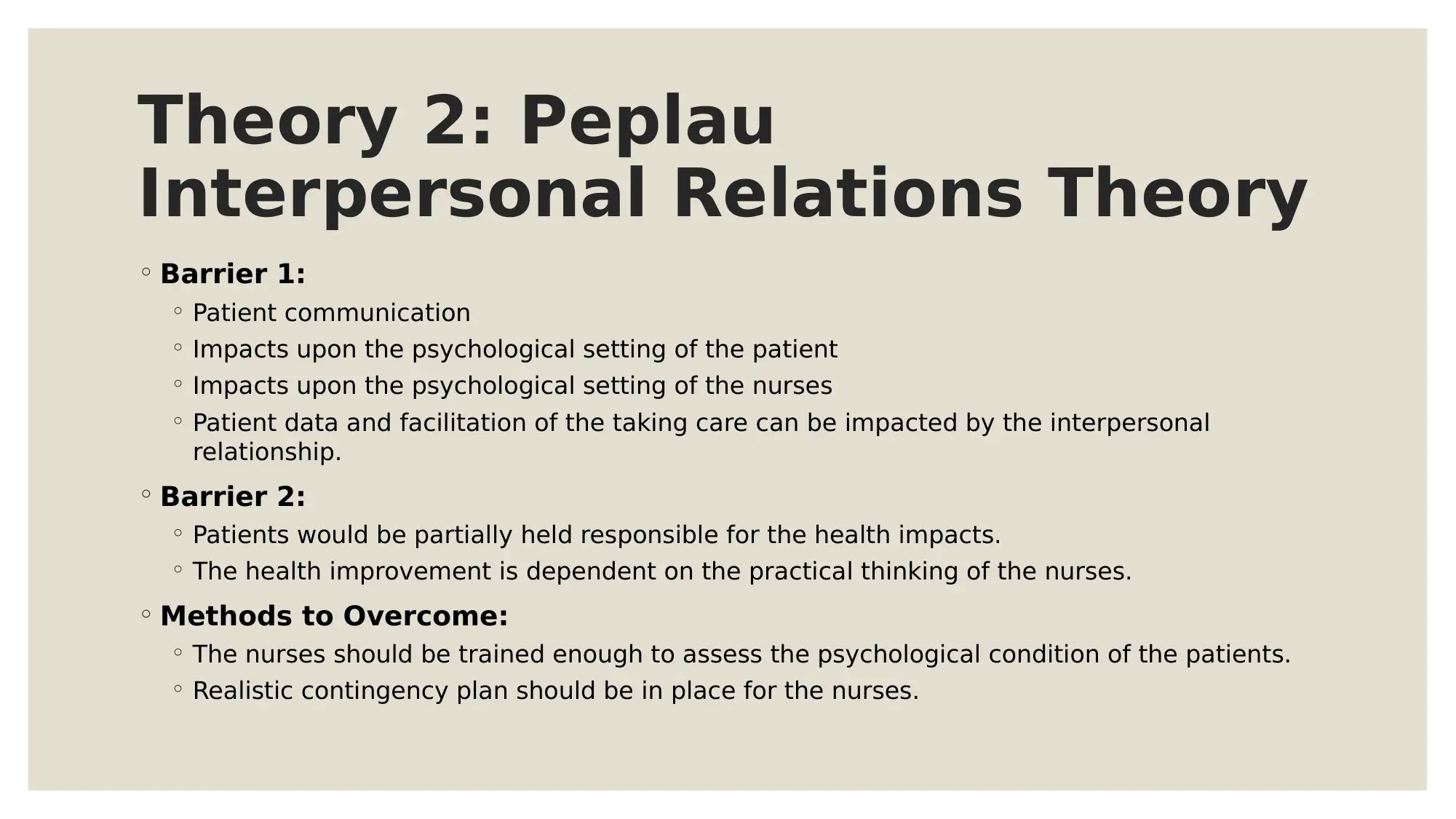
Theory 2: Peplau
Interpersonal Relations Theory
◦ Barrier 1:
◦ Patient communication
◦ Impacts upon the psychological setting of the patient
◦ Impacts upon the psychological setting of the nurses
◦ Patient data and facilitation of the taking care can be impacted by the interpersonal
relationship.
◦ Barrier 2:
◦ Patients would be partially held responsible for the health impacts.
◦ The health improvement is dependent on the practical thinking of the nurses.
◦ Methods to Overcome:
◦ The nurses should be trained enough to assess the psychological condition of the patients.
◦ Realistic contingency plan should be in place for the nurses.
Interpersonal Relations Theory
◦ Barrier 1:
◦ Patient communication
◦ Impacts upon the psychological setting of the patient
◦ Impacts upon the psychological setting of the nurses
◦ Patient data and facilitation of the taking care can be impacted by the interpersonal
relationship.
◦ Barrier 2:
◦ Patients would be partially held responsible for the health impacts.
◦ The health improvement is dependent on the practical thinking of the nurses.
◦ Methods to Overcome:
◦ The nurses should be trained enough to assess the psychological condition of the patients.
◦ Realistic contingency plan should be in place for the nurses.
Paraphrase This Document
Need a fresh take? Get an instant paraphrase of this document with our AI Paraphraser
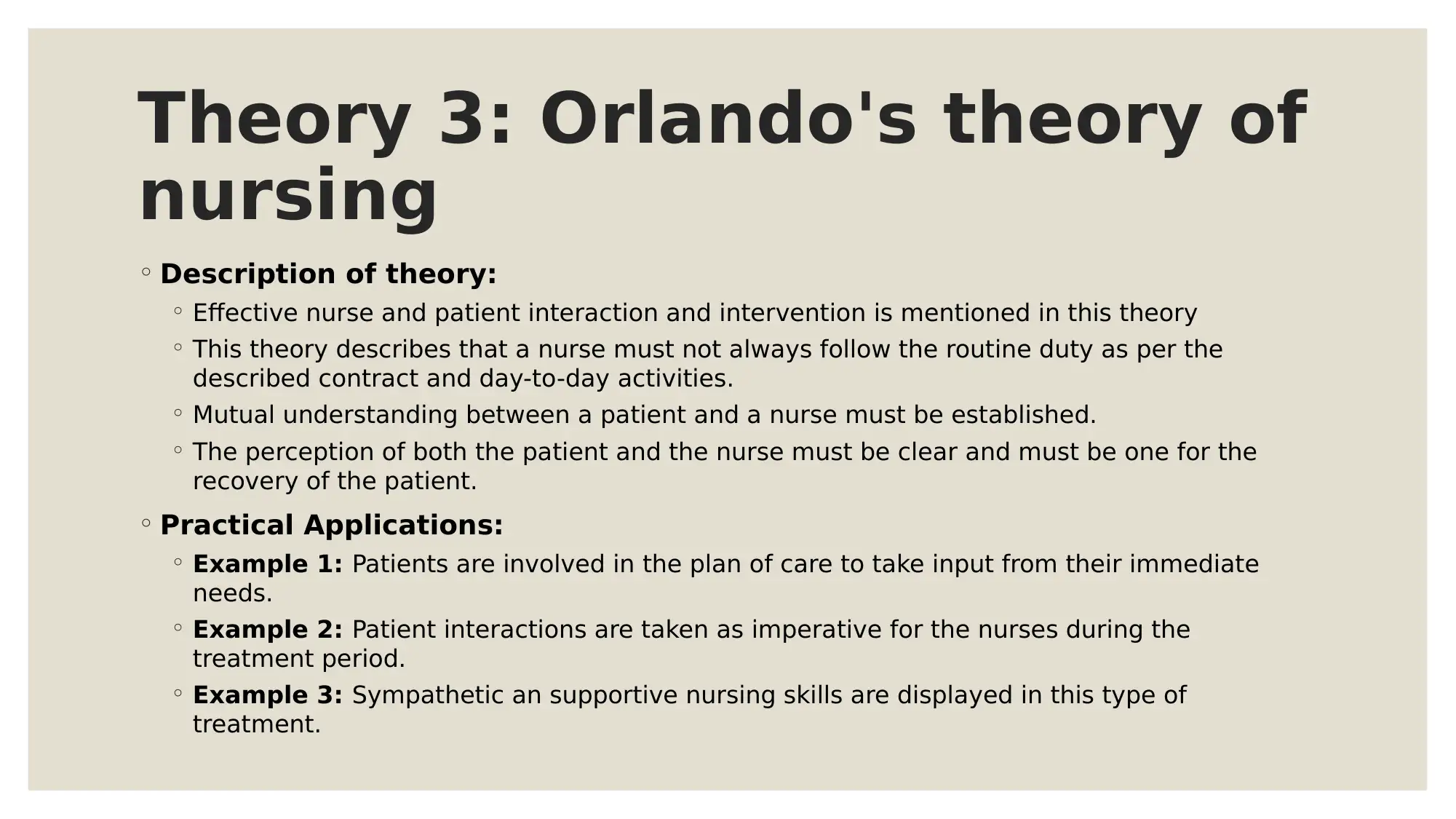
Theory 3: Orlando's theory of
nursing
◦ Description of theory:
◦ Effective nurse and patient interaction and intervention is mentioned in this theory
◦ This theory describes that a nurse must not always follow the routine duty as per the
described contract and day-to-day activities.
◦ Mutual understanding between a patient and a nurse must be established.
◦ The perception of both the patient and the nurse must be clear and must be one for the
recovery of the patient.
◦ Practical Applications:
◦ Example 1: Patients are involved in the plan of care to take input from their immediate
needs.
◦ Example 2: Patient interactions are taken as imperative for the nurses during the
treatment period.
◦ Example 3: Sympathetic an supportive nursing skills are displayed in this type of
treatment.
nursing
◦ Description of theory:
◦ Effective nurse and patient interaction and intervention is mentioned in this theory
◦ This theory describes that a nurse must not always follow the routine duty as per the
described contract and day-to-day activities.
◦ Mutual understanding between a patient and a nurse must be established.
◦ The perception of both the patient and the nurse must be clear and must be one for the
recovery of the patient.
◦ Practical Applications:
◦ Example 1: Patients are involved in the plan of care to take input from their immediate
needs.
◦ Example 2: Patient interactions are taken as imperative for the nurses during the
treatment period.
◦ Example 3: Sympathetic an supportive nursing skills are displayed in this type of
treatment.
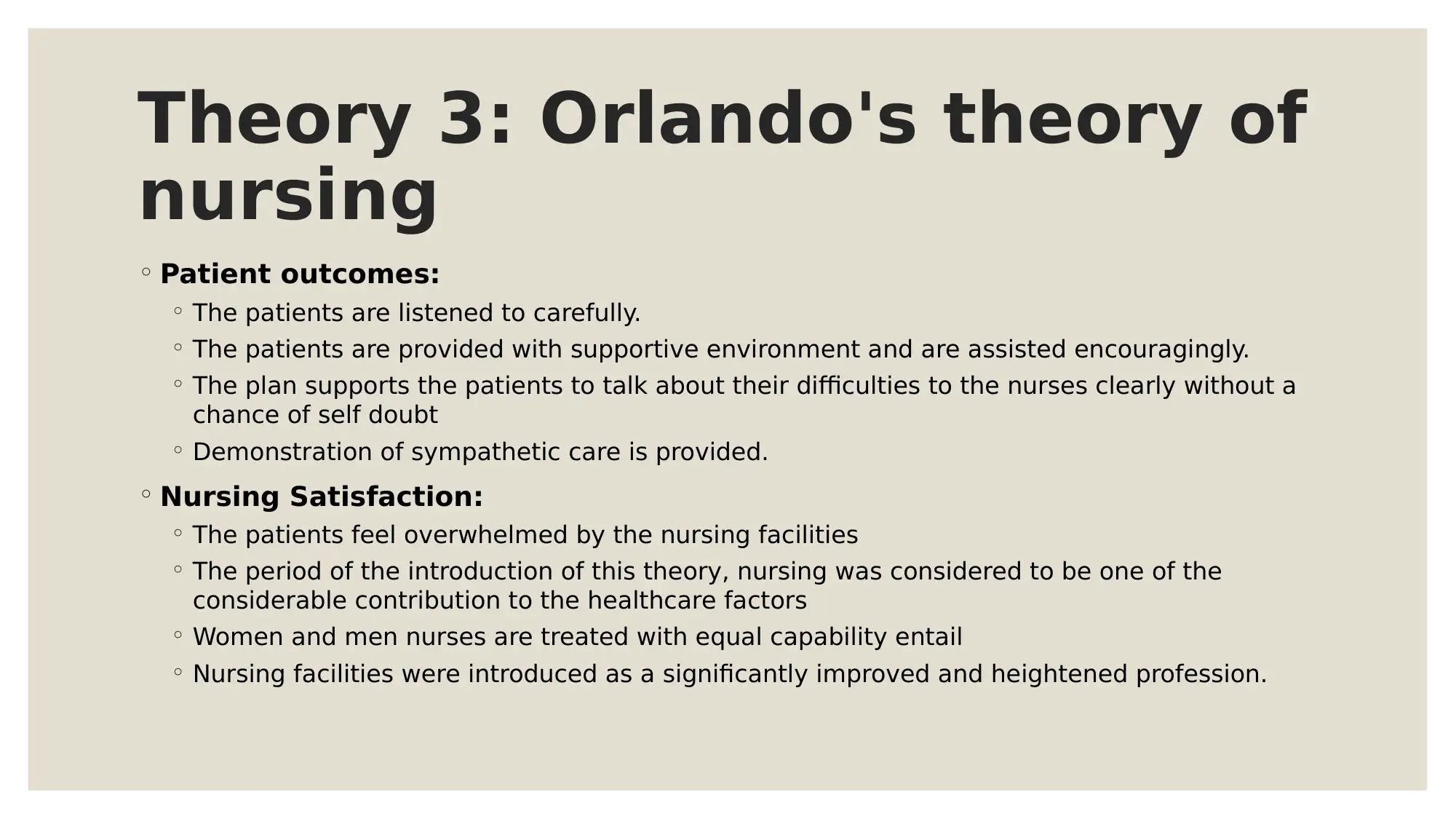
Theory 3: Orlando's theory of
nursing
◦ Patient outcomes:
◦ The patients are listened to carefully.
◦ The patients are provided with supportive environment and are assisted encouragingly.
◦ The plan supports the patients to talk about their difficulties to the nurses clearly without a
chance of self doubt
◦ Demonstration of sympathetic care is provided.
◦ Nursing Satisfaction:
◦ The patients feel overwhelmed by the nursing facilities
◦ The period of the introduction of this theory, nursing was considered to be one of the
considerable contribution to the healthcare factors
◦ Women and men nurses are treated with equal capability entail
◦ Nursing facilities were introduced as a significantly improved and heightened profession.
nursing
◦ Patient outcomes:
◦ The patients are listened to carefully.
◦ The patients are provided with supportive environment and are assisted encouragingly.
◦ The plan supports the patients to talk about their difficulties to the nurses clearly without a
chance of self doubt
◦ Demonstration of sympathetic care is provided.
◦ Nursing Satisfaction:
◦ The patients feel overwhelmed by the nursing facilities
◦ The period of the introduction of this theory, nursing was considered to be one of the
considerable contribution to the healthcare factors
◦ Women and men nurses are treated with equal capability entail
◦ Nursing facilities were introduced as a significantly improved and heightened profession.
⊘ This is a preview!⊘
Do you want full access?
Subscribe today to unlock all pages.

Trusted by 1+ million students worldwide
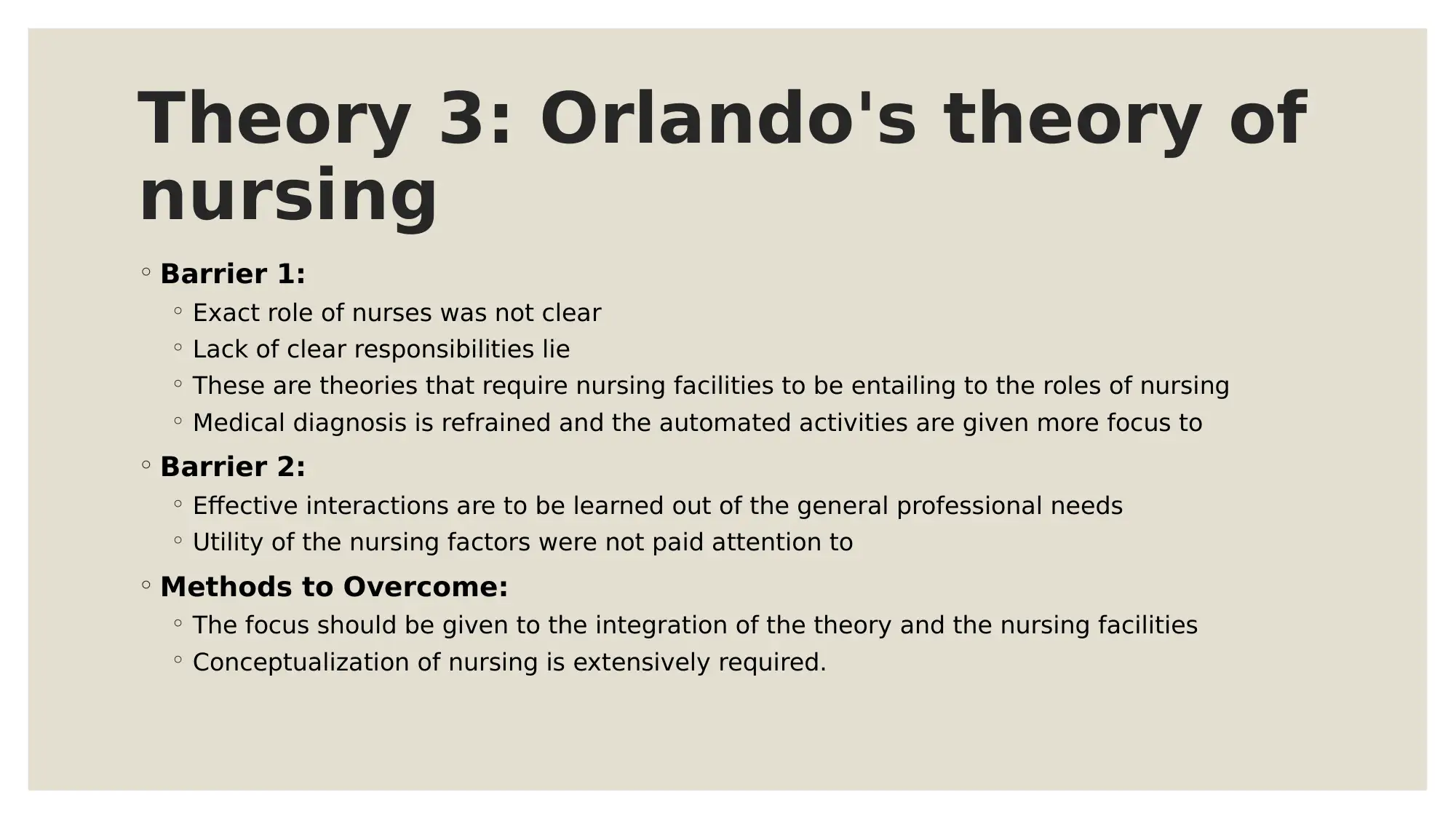
Theory 3: Orlando's theory of
nursing
◦ Barrier 1:
◦ Exact role of nurses was not clear
◦ Lack of clear responsibilities lie
◦ These are theories that require nursing facilities to be entailing to the roles of nursing
◦ Medical diagnosis is refrained and the automated activities are given more focus to
◦ Barrier 2:
◦ Effective interactions are to be learned out of the general professional needs
◦ Utility of the nursing factors were not paid attention to
◦ Methods to Overcome:
◦ The focus should be given to the integration of the theory and the nursing facilities
◦ Conceptualization of nursing is extensively required.
nursing
◦ Barrier 1:
◦ Exact role of nurses was not clear
◦ Lack of clear responsibilities lie
◦ These are theories that require nursing facilities to be entailing to the roles of nursing
◦ Medical diagnosis is refrained and the automated activities are given more focus to
◦ Barrier 2:
◦ Effective interactions are to be learned out of the general professional needs
◦ Utility of the nursing factors were not paid attention to
◦ Methods to Overcome:
◦ The focus should be given to the integration of the theory and the nursing facilities
◦ Conceptualization of nursing is extensively required.
Paraphrase This Document
Need a fresh take? Get an instant paraphrase of this document with our AI Paraphraser
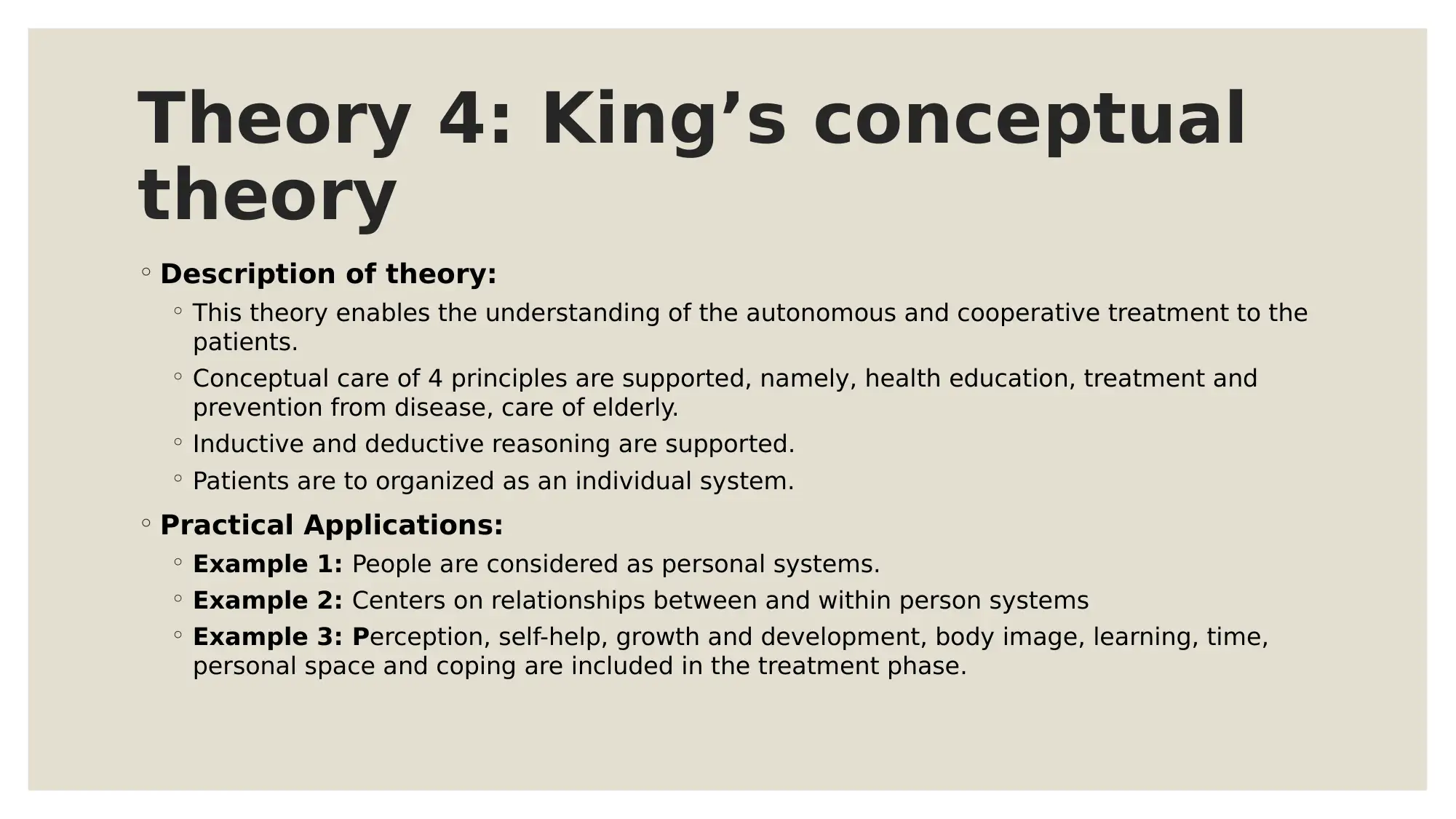
Theory 4: King’s conceptual
theory
◦ Description of theory:
◦ This theory enables the understanding of the autonomous and cooperative treatment to the
patients.
◦ Conceptual care of 4 principles are supported, namely, health education, treatment and
prevention from disease, care of elderly.
◦ Inductive and deductive reasoning are supported.
◦ Patients are to organized as an individual system.
◦ Practical Applications:
◦ Example 1: People are considered as personal systems.
◦ Example 2: Centers on relationships between and within person systems
◦ Example 3: Perception, self-help, growth and development, body image, learning, time,
personal space and coping are included in the treatment phase.
theory
◦ Description of theory:
◦ This theory enables the understanding of the autonomous and cooperative treatment to the
patients.
◦ Conceptual care of 4 principles are supported, namely, health education, treatment and
prevention from disease, care of elderly.
◦ Inductive and deductive reasoning are supported.
◦ Patients are to organized as an individual system.
◦ Practical Applications:
◦ Example 1: People are considered as personal systems.
◦ Example 2: Centers on relationships between and within person systems
◦ Example 3: Perception, self-help, growth and development, body image, learning, time,
personal space and coping are included in the treatment phase.
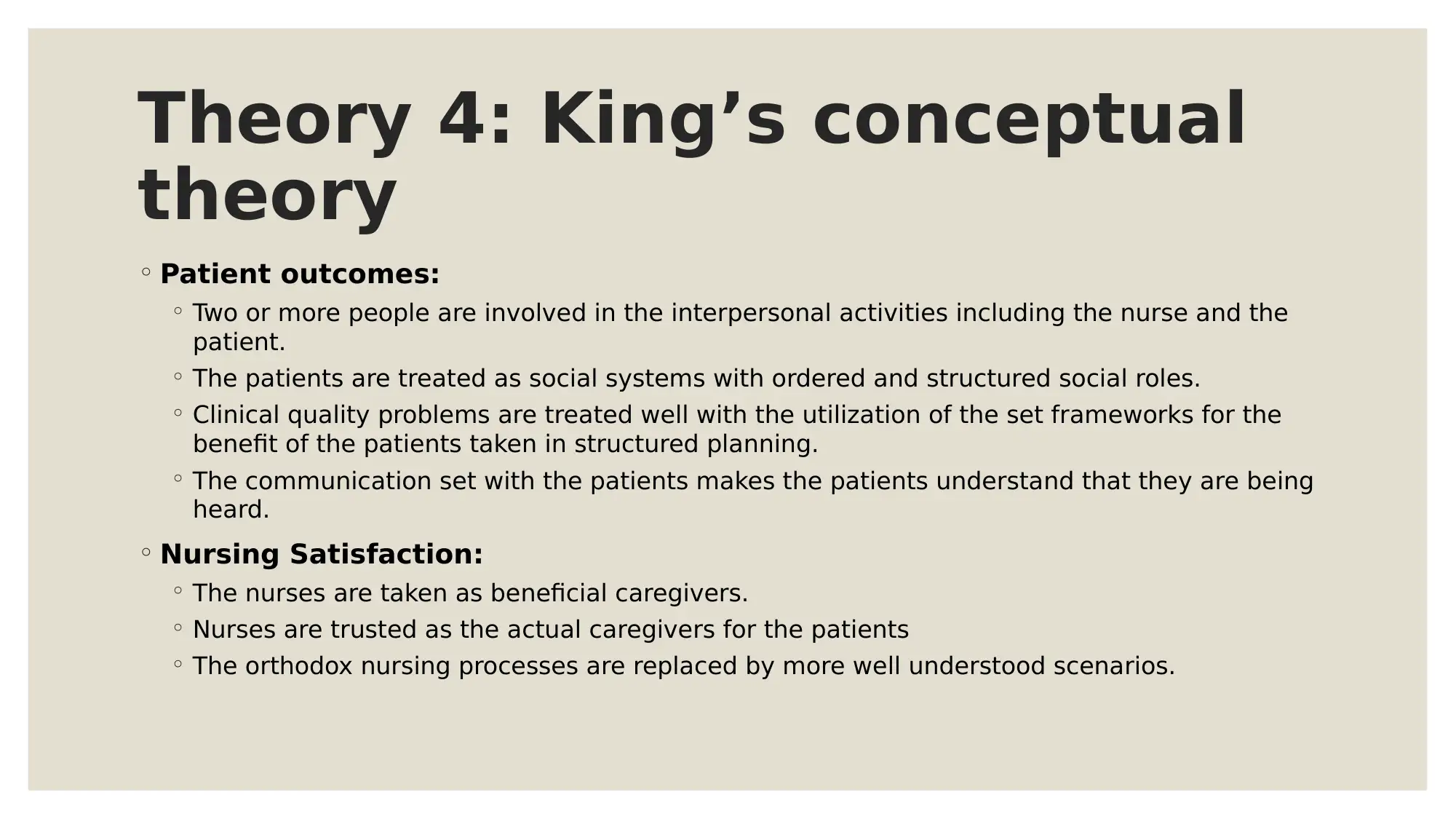
Theory 4: King’s conceptual
theory
◦ Patient outcomes:
◦ Two or more people are involved in the interpersonal activities including the nurse and the
patient.
◦ The patients are treated as social systems with ordered and structured social roles.
◦ Clinical quality problems are treated well with the utilization of the set frameworks for the
benefit of the patients taken in structured planning.
◦ The communication set with the patients makes the patients understand that they are being
heard.
◦ Nursing Satisfaction:
◦ The nurses are taken as beneficial caregivers.
◦ Nurses are trusted as the actual caregivers for the patients
◦ The orthodox nursing processes are replaced by more well understood scenarios.
theory
◦ Patient outcomes:
◦ Two or more people are involved in the interpersonal activities including the nurse and the
patient.
◦ The patients are treated as social systems with ordered and structured social roles.
◦ Clinical quality problems are treated well with the utilization of the set frameworks for the
benefit of the patients taken in structured planning.
◦ The communication set with the patients makes the patients understand that they are being
heard.
◦ Nursing Satisfaction:
◦ The nurses are taken as beneficial caregivers.
◦ Nurses are trusted as the actual caregivers for the patients
◦ The orthodox nursing processes are replaced by more well understood scenarios.
⊘ This is a preview!⊘
Do you want full access?
Subscribe today to unlock all pages.

Trusted by 1+ million students worldwide
1 out of 28
Related Documents
Your All-in-One AI-Powered Toolkit for Academic Success.
+13062052269
info@desklib.com
Available 24*7 on WhatsApp / Email
![[object Object]](/_next/static/media/star-bottom.7253800d.svg)
Unlock your academic potential
Copyright © 2020–2025 A2Z Services. All Rights Reserved. Developed and managed by ZUCOL.





